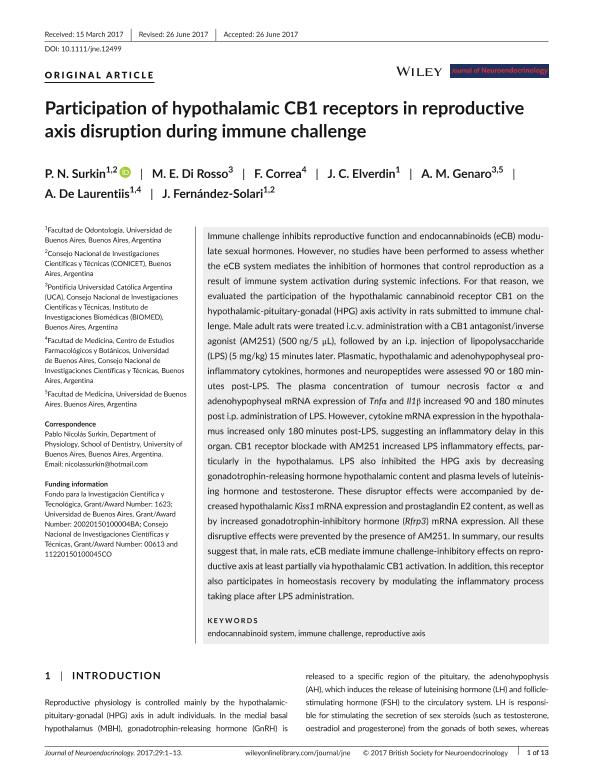Artículo
Participation of hypothalamic CB1 receptors in reproductive axis disruption during immune challenge
Surkin, Pablo Nicolas ; Di Rosso, María Emilia
; Di Rosso, María Emilia ; Correa, Fernando Gabriel
; Correa, Fernando Gabriel ; Elverdín, Juan Carlos; Genaro, Ana Maria
; Elverdín, Juan Carlos; Genaro, Ana Maria ; de Laurentiis, Andrea
; de Laurentiis, Andrea ; Fernández Solari, José Javier
; Fernández Solari, José Javier
 ; Di Rosso, María Emilia
; Di Rosso, María Emilia ; Correa, Fernando Gabriel
; Correa, Fernando Gabriel ; Elverdín, Juan Carlos; Genaro, Ana Maria
; Elverdín, Juan Carlos; Genaro, Ana Maria ; de Laurentiis, Andrea
; de Laurentiis, Andrea ; Fernández Solari, José Javier
; Fernández Solari, José Javier
Fecha de publicación:
01/08/2017
Editorial:
Wiley Blackwell Publishing, Inc
Revista:
Journal of Neuroendocrinology
ISSN:
0953-8194
Idioma:
Inglés
Tipo de recurso:
Artículo publicado
Clasificación temática:
Resumen
Immune challenge inhibits reproductive function and endocannabinoids (eCB) modulate sexual hormones. However, no studies have been performed to assess whether the eCB system mediates the inhibition of hormones that control reproduction as a result of immune system activation during systemic infections. For that reason, we evaluated the participation of the hypothalamic cannabinoid receptor CB1 on the hypothalamic-pituitary-gonadal (HPG) axis activity in rats submitted to immune challenge. Male adult rats were treated i.c.v. administration with a CB1 antagonist/inverse agonist (AM251) (500 ng/5 μL), followed by an i.p. injection of lipopolysaccharide (LPS) (5 mg/kg) 15 minutes later. Plasmatic, hypothalamic and adenohypophyseal pro-inflammatory cytokines, hormones and neuropeptides were assessed 90 or 180 minutes post-LPS. The plasma concentration of tumour necrosis factor α and adenohypophyseal mRNA expression of Tnfα and Il1β increased 90 and 180 minutes post i.p. administration of LPS. However, cytokine mRNA expression in the hypothalamus increased only 180 minutes post-LPS, suggesting an inflammatory delay in this organ. CB1 receptor blockade with AM251 increased LPS inflammatory effects, particularly in the hypothalamus. LPS also inhibited the HPG axis by decreasing gonadotrophin-releasing hormone hypothalamic content and plasma levels of luteinising hormone and testosterone. These disruptor effects were accompanied by decreased hypothalamic Kiss1 mRNA expression and prostaglandin E2 content, as well as by increased gonadotrophin-inhibitory hormone (Rfrp3) mRNA expression. All these disruptive effects were prevented by the presence of AM251. In summary, our results suggest that, in male rats, eCB mediate immune challenge-inhibitory effects on reproductive axis at least partially via hypothalamic CB1 activation. In addition, this receptor also participates in homeostasis recovery by modulating the inflammatory process taking place after LPS administration.
Palabras clave:
Endocannabinoid System
,
Immune Challenge
,
Reproductive Axis
Archivos asociados
Licencia
Identificadores
Colecciones
Articulos(CEFYBO)
Articulos de CENTRO DE ESTUDIOS FARMACOLOGICOS Y BOTANICOS
Articulos de CENTRO DE ESTUDIOS FARMACOLOGICOS Y BOTANICOS
Articulos(OCA HOUSSAY)
Articulos de OFICINA DE COORDINACION ADMINISTRATIVA HOUSSAY
Articulos de OFICINA DE COORDINACION ADMINISTRATIVA HOUSSAY
Citación
Surkin, Pablo Nicolas; Di Rosso, María Emilia; Correa, Fernando Gabriel; Elverdín, Juan Carlos; Genaro, Ana Maria; et al.; Participation of hypothalamic CB1 receptors in reproductive axis disruption during immune challenge; Wiley Blackwell Publishing, Inc; Journal of Neuroendocrinology; 29; 8; 1-8-2017; 1-13
Compartir
Altmétricas



